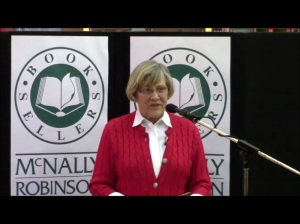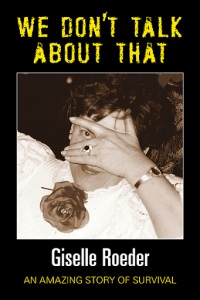 Born in a rural village in Pomerania, Giselle escaped from East Germany to West Berlin, where she became a health educator. Following her emigration to Canada, she became well-known as an international public speaker in the developing alternative health field. Her publishing credits include two books about healthy living and her memoir, which covers the incredible story of survival during her first thirty years. Welcome, Giselle!
Born in a rural village in Pomerania, Giselle escaped from East Germany to West Berlin, where she became a health educator. Following her emigration to Canada, she became well-known as an international public speaker in the developing alternative health field. Her publishing credits include two books about healthy living and her memoir, which covers the incredible story of survival during her first thirty years. Welcome, Giselle!
Tell us a little about yourself. I was born the oldest of four girls. Each time one of us arrived, it was a bit of a disappointment for my dad since he wanted a boy. Later he was glad he did not have one since “boys are cannon fodder for the next war.” My homeland was lost after WWII when we were evicted and trekked along next to the Russian war machinery with hundreds of thousands of others for weeks. For a long time I did not put down any new roots.
What is the title and genre of your book, and who published it? My latest book is a historic memoir. The answers of the people I interviewed about the happenings during 1945 became the title of the book: We Don’t Talk about That. It is very fitting because people still give that answer if they were involved in a war, no matter which war or what nationalities they are. Women don’t talk about abuse, stalking, or rape. My book was published in April 2014 by Friesen Press.
Tell us a little about your latest book. We Don’t Talk about That tells  what people didn’t dare to talk about. It spans the years after WWI to 1963 when I had to make a life-changing decision. My memories are about the ten years I lived with the Nazis in power, and then ten years under communist rule, which wasn’t very different from the Nazis and even worse for my family. The decade after my escape to the “Golden West,” I learned it wasn’t so “golden” after all. I had to start my life all over again and deal with always being regarded as a second-class citizen. My story is also the story of thousands of women who endured the atrocities and rapes of the advancing Russian army, hunger, starvation, survival, the re-building of Germany under two German States, the education system, abuse and stalking of men in power, and the confrontation with a convicted rapist which finally drove me to one overwhelming decision: Emigration — away from it all.
what people didn’t dare to talk about. It spans the years after WWI to 1963 when I had to make a life-changing decision. My memories are about the ten years I lived with the Nazis in power, and then ten years under communist rule, which wasn’t very different from the Nazis and even worse for my family. The decade after my escape to the “Golden West,” I learned it wasn’t so “golden” after all. I had to start my life all over again and deal with always being regarded as a second-class citizen. My story is also the story of thousands of women who endured the atrocities and rapes of the advancing Russian army, hunger, starvation, survival, the re-building of Germany under two German States, the education system, abuse and stalking of men in power, and the confrontation with a convicted rapist which finally drove me to one overwhelming decision: Emigration — away from it all.
My book has incredible reviews from history writers as well as many readers, and the most commonly used phrase is, “I couldn’t put it down.” One writer even said, “It should be desired reading in schools and given the same historical literary importance as The Diary of Anne Frank.”
What inspired you to write it? I was invited by a Probus Club, an offspring of the Rotary for retired people, to talk about my memories of the WWII years during a Remembrance Day celebration. When I was finished speaking the audience were asking, “Do you have a book?” Since my answer was “No,” they kept pushing and prompting until I decided I would have to write it all down. It took me nearly 3 years until I could tell them, “It is published.”
 When did you first start writing? I always loved writing, ever since I was in school and we had to write essays. During my late teens I wrote for newspapers about my kayak club, our regattas, competitions and special outings, paddling, sailing, and camping. After my emigration to Canada, I wrote a regular column for a German Newspaper about “alternative health, nutrition, lifestyle.” Once my English
When did you first start writing? I always loved writing, ever since I was in school and we had to write essays. During my late teens I wrote for newspapers about my kayak club, our regattas, competitions and special outings, paddling, sailing, and camping. After my emigration to Canada, I wrote a regular column for a German Newspaper about “alternative health, nutrition, lifestyle.” Once my English  was more solid, I wrote for several magazines about the same topics. I became an international speaker on those subjects and was a regular at many health conferences. In 1999 and 2000, I was invited by a publisher of health books to write my books, Healing with Water and Sauna: Hottest Way to Good Health. Those two health books are still available through book stores and online channels.
was more solid, I wrote for several magazines about the same topics. I became an international speaker on those subjects and was a regular at many health conferences. In 1999 and 2000, I was invited by a publisher of health books to write my books, Healing with Water and Sauna: Hottest Way to Good Health. Those two health books are still available through book stores and online channels.
What authors have most influenced you? How and why? In 1945 after WWII ended, there was about a year before school started again. In East Germany, my little village school had about half a dozen books. I read them all despite the fact that they were heavy duty books, like War and Peace by Tolstoy and old books by Goethe, Lessing, Tucholsky, Dostoyevsky. How these books were in our small school remains a mystery, since all Jewish and Russian works had been burned by the Nazis.
Jane Austin’s Pride and Prejudice and Colleen McCullough’s Thornbirds and her Roman History series probably influenced me more than anything else. A French writer, Anne Golon, got me deeply interested in French history, and ever since I like to read historic novels.
What book first touched you deeply? It was probably The Thornbirds. Since I was also interested in the world religions, this book was such an eye opener. I met Colleen McCullough and she made a deep impression on me. I wanted to read more of her writings and I did go through all her Roman history books, interestingly enough by picking them up as “Talking Books” from my library. What a brain! A lady looking like a neighbourhood housewife, yet, as I said, she made quite an impression.
What genres do you like to read? In my youth, mostly romance. Later, historic novels and health books — because of my education — also mysteries and a few thrillers, but I mainly like to read books with a true historic background. Ann Victoria Robert’s books — Louisa Elliot, Liam’s Story, The Master’s Tale — I liked a lot. Also war memoirs, because I became more interested having written my own book.
How do these books affect your writing? I do my writing totally based on my own memories. I don’t want anybody to affect my style or what I remember. And since that is what I write, it is not a problem.
Where do you like to write? Why? I have my little dark green den with my desk, computer, and my favourite paintings on the walls. It’s the only place I write. When I have to think, I look at the large painting over my desk and let my thoughts fly. I tried to write outside, but the reflection of sun and shade made it impossible.
What time of day do you like to write. Why? I write when the “muse” hits me. Sometimes I have to get up in the middle of the night. When I have had a good night’s sleep, I like to write in the
mornings; otherwise, I prefer the quiet of the after-dinner time. I cannot write when there is noise since it distracts me.
In what genres do you write? So far it is health and history — memoir, true stories.
E-book or paper ~ do you have a preference? I love books, real books. But I do read E-books as well. I like audio books since I can do some needed handy work while listening to them.
How and where have you marketed your work? My publisher markets it worldwide through Ingram, Barnes & Noble, Amazon, and all the other channels. I have done a lot of readings in clubs and libraries. I have a web site, am relatively active on social media, and am trying to get as many book-signing sessions in book stores as possible.
Do you have other publishing credits? Only the two health books mentioned earlier.
What is your current writing project? I am working on a collection of short stories, but my main project is the continuation of my memoir, We Don’t Talk about That. My readers are screaming for more — “…and what happened then…” — and I feel responsible to let them know how my life evolved after I left my old continent, started anew on another with a new language, new culture, new people, and the incredible ups and downs in my life. When I think of my life, I cannot believe that I was the little “Gila” from the lost homeland of Pomerania who was bullied and kicked around, faced a pistol pointed at her face, almost died several times, dropped out of school because she had no shoes or decent clothing, made it despite all odds, and is now writing books that people want to read and enjoy and are asking for more.
If you have a blog, what subjects do write about? I write a fairly regular blog. Sometimes it’s related to my health books, sometimes to my memoir, but most often it’s about unusual stories of people I met during travel, work, or other circumstances, e.g., adoption, love in old age, kayaking. A number of these stories will be in my short-story book since I cannot fit them all into my sequel to We Don’t Talk about That.
Where can your books be purchased? Any bookstore can order copies since they are on computers worldwide. My memoir — which is available in hardcover, soft cover, and e-book — is available from my publisher (distributed by Ingram) as well as through Amazon, Barnes & Noble, and all the other channels.
What advice would you give a new writer? Based on my own experience: Don’t keep going back to the chapters you wrote again and again to edit. No — write, write, write until you think your story is written. Now read again. You’ll want to change it, re-write sentences. When you are done with this first time re-reading and changing, read it again. This time you may find you want to re-write not just sentences, but also some chapters. I went through my memoir many times.
After that, have maybe three copies printed out at a print shop and put into folders. Then ask several trusted friends to read it, give you their opinion, and have each put sticky notes on certain pages. Duly study these sticky notes, and then remove them before you pass it on to the next person. I had nine people read mine, and I also had an editor through my publisher. An outside professional editor is very important.
What do you wish to say to your readers? Thank you for encouraging me to write a sequel. Thank you for loving my book, for letting me know how much you enjoyed it, for telling me how amazed you are that you are learning a part of history that nobody talked about, and for letting me know that you don’t even want to lend out your copy but tell others about it and get them to buy their own copy.
Learn more about Giselle: Website Amazon Twitter Facebook LinkedIn Google+ FriesenPress
